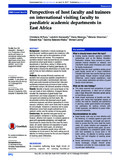| dc.contributor.author | Russ, CM | |
| dc.contributor.author | Ganapathi, L | |
| dc.contributor.author | Marangu, D | |
| dc.contributor.author | Silverman, M | |
| dc.contributor.author | Kija, E | |
| dc.contributor.author | Bakeera-Kitaka, S | |
| dc.contributor.author | Laving, A | |
| dc.date.accessioned | 2017-06-13T07:13:03Z | |
| dc.date.available | 2017-06-13T07:13:03Z | |
| dc.date.issued | 2016 | |
| dc.identifier.citation | Russ, Christiana M., et al. "Perspectives of host faculty and trainees on international visiting faculty to paediatric academic departments in East Africa." BMJ Global Health 1.3 (2016): e000097. | en_US |
| dc.identifier.uri | https://www.ncbi.nlm.nih.gov/pubmed/28588960 | |
| dc.identifier.uri | http://gh.bmj.com/content/1/3/e000097 | |
| dc.identifier.uri | http://hdl.handle.net/11295/101035 | |
| dc.description.abstract | BACKGROUND:
Investments in faculty exchanges to build physician workforce capacity are increasing. Little attention has been paid to the expectations of host institution faculty and trainees. This prospective qualitative research study explored faculty and resident perspectives about guest faculty in paediatric departments in East Africa, asking (1) What are the benefits and challenges of hosting guest faculty, (2) What factors influence the effectiveness of faculty visits and (3) How do host institutions prepare for faculty visits?
METHODS:
We recruited 36 faculty members and residents from among four paediatric departments in East Africa to participate in semistructured interviews which were audio recorded and transcribed. Data were qualitatively analysed using principles of open coding and thematic analysis. We achieved saturation of themes.
RESULTS:
Benefits of faculty visits varied based on the size and needs of host institutions. Emergent themes included the importance of guest faculty time commitment, and mutual preparation to ensure that visit goals and scheduling met host needs. We documented conflicts that developed around guest emotional responses and ethical approaches to clinical resource limitations, which some hosts tried to prepare for and mitigate. Imbalance in resources led to power differentials; some hosts sought partnerships to re-establish control over the process of having guests.
CONCLUSIONS:
We identified that guest faculty can assist paediatric institutions in building capacity; however, effective visits require: (1) mutually agreed on goals with appropriate scheduling, visit length and commitment to ensure that the visits meet the host's needs, (2) careful selection and preparation of guest faculty to meet the host's goals, (3) emotional preparation by prospective guests along with host orientation to clinical work in the host's setting and (4) attention to funding sources for the visit and mitigation of resulting power differentials. | en_US |
| dc.language.iso | en | en_US |
| dc.publisher | University of Nairobi | en_US |
| dc.rights | Attribution-NonCommercial-NoDerivs 3.0 United States | * |
| dc.rights.uri | http://creativecommons.org/licenses/by-nc-nd/3.0/us/ | * |
| dc.title | Perspectives of host faculty and trainees on international visiting faculty to paediatric academic departments in East Africa. | en_US |
| dc.type | Article | en_US |



